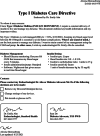Understanding the needs of people aging with type 1 diabetes: a user-focused research study with prototype diabetes advance directive and setting the stage for future research
- PMID: 35607592
- PMCID: PMC9117598
- DOI: 10.1007/s40200-022-01056-6
Understanding the needs of people aging with type 1 diabetes: a user-focused research study with prototype diabetes advance directive and setting the stage for future research
Abstract
Purpose: People living with Type 1 diabetes (T1D) are living longer than ever and facing the new "luxury" of the challenges of aging. While research is slowly expanding and addressing T1D physiology with regards to aging, there is little research addressing specific challenges and barriers to optimal care by those aging with T1D. To address this gap, this study employed human-centered design research to explore the gaps and barriers to care faced by people aging with T1D.
Methods: Researchers employed human-centered design methods of needfinding and user interviews and facilitated participatory workshops. In total, 27 people with T1D (PWT1D), 5 loved ones (partners of PWT1D), and 7 healthcare providers (HCPs) were engaged.
Results: Design artifacts were developed, including user personas that help visually articulate the different experiences of PWT1D and their unique needs as they age, as well as a prototype diabetes-specific advance directive that could be further refined to specifically aid those with Type 1 diabetes who are aging and requiring more interactions with the healthcare system. Initial user testing with people with T1D as well as healthcare providers demonstrated the need for such a diabetes advance directive tool or document.
Conclusion: This work supports the conclusion that additional focus and scientific enquiry should be given to the needs of people aging with Type 1 diabetes, with a goal of improving the experience of all people with T1D when interacting with their care providers or with the healthcare system as a whole.
Keywords: Advance directive; Aging; Care planning; Diabetes; Diabetes advance directive; Diabetes self-management; Patient and public involvement; T1D; Type 1 diabetes.
© Springer Nature Switzerland AG 2022.
Conflict of interest statement
Conflicts of interest/Competing interestsOn behalf of all authors, the corresponding author states that there is no conflict of interest.
Figures






References
-
- Advances in HIV treatment uncover a new issue: Aging. Healio. (n.d.). https://www.healio.com/news/infectious-disease/20140218/10_3928_1081_597.... Accessed 15 Nov 2021.
LinkOut - more resources
Full Text Sources
Miscellaneous

